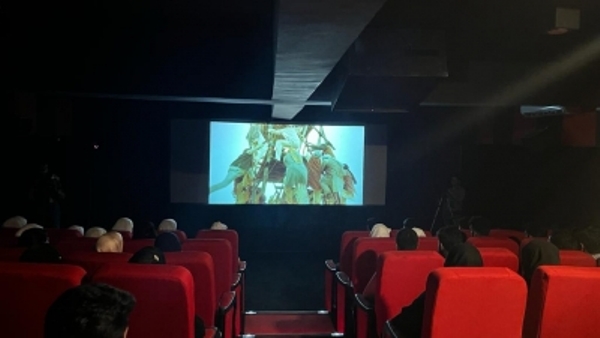Kashmir multiplex, a new dawn of hope
SUBHASHIS MITTRA - Wide Angle
Srinagar has got its first multiplex three decades after militancy closed cinemas in Kashmir. Locals hope not only for entertainment, but inspiration for a regional film industry and drop in unemployment rate.
With the inauguration of Kashmir’s first ever multiplex by Lieutenant Governor Manoj Sinha in Srinagar, the experience of watching a film in a theatre returns to the Valley after gap of 32 years after the separatist militants imposed 'ban' on cinema and enforced it with repression and violence.
It's heartening to note that a prominent political and business family with stake in entertainment, education and hospitality, completed construction of a multiplex of three auditoriums with 520 seats. The complex will screen popular Indian films.
The purpose behind opening threatres in Kashmir is two-fold -- to provide facilities for entertainment to children and to strengthen the bond between Kashmir and the Indian film industry. Kashmir’s relationship with Indian film industry was very good in the past, so it will be a contribution towards reviving the previous ties.
Against this backdrop, Lt Guv Manoj Sinha's government introduced Jammu and Kashmir's first film policy in early 2021 with the commitment of security, financial and logistic support to the people who were interested in shooting their films in the Union Territory or to revive and establish theatres in the valley. A number of the film producers have since submitted their proposals to the government.
Kashmir used to be the outdoor shooting hub for Bollywood and other Indian films from 1940 to 1989. MG Ramachandran, J Jayalalitha, Dileep Kumar, Nargis, Shami Kapoor, Shashi Kapoor, Amitabh Bachchan, Rajesh Khanna and Dimple Kapadia were among the top Indian film celebrities who acted in a long list of the Indian movies shot in Kashmir.
Even after the closure of cinema, more than 20 Indian films, including Vidhu Vinod Chopra's 'Mission Kashmir' and 'Shikara', Vishal Bhardwaj's 'Haider' and Vivek Agnihotri's 'Kashmir Files', were shot in Kashmir.
It was at the start of a separatist-Islamist movement in Kashmir, cinema, beauty parlours, video libraries, wine shops and other entertainment outlets were 'banned' across the Valley by militants with the ultimate deadline of December 31, 1989, after a six-month-long sustained campaign.
Dukhtaran-e-Millat of Asiya Andrabi and 'Air Marshal Noor Khan', with the guerrilla outfits 'Allah Tigers' and 'Hizbullah' at their back, were at the forefront of the campaign which received the first peoples support during a flare up against Salman Rushdie's controversial novel 'Satanic Verses'.
After Farooq Abdullah's National Conference (NC) returned to power in 1996, several attempts were made by the state government to revive cinema. Three theatres were reopened in Srinagar, but the militants unleashed a fresh wave of fear. Consequently, all the three theatres were again closed.
A pertinent question is will the reopening of movie theatres be a new, happy script for J-K? One hopeful sign surely is that the kind of religious obscurantism that held sway in the 1990s is absent now. The other is that in an area still waiting for major industrial investment, local economy can benefit from any kind of commercial activity – with authorities promising a theatre in each district of the UT, and with audiences, especially the young, starved of the “going to a movie” experience, the economic impact is likely to be non-trivial.
Plus, there was a particular poignancy in Kashmir losing both its status as India’s most-favoured movie locale as well as its movie halls. It’s important to note here, in the cultural context, that Saudi Arabia allowed movie theatres to operate as part of its overall de-radicalisation moves.
Every move to normalise life in Kashmir is welcome, and it's no doubt that the biggest move, without which the sum of others won’t get traction, is holding elections in J-K. Gains from the nullification of Article 370 cannot fully materialise unless Kashmir’s people are made to feel like stakeholders in their own development. And that can only happen if J-K is able to elect its own politicians to manage its affairs.
